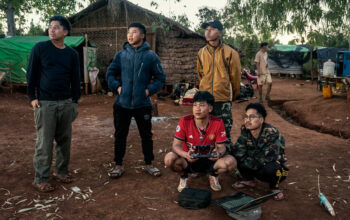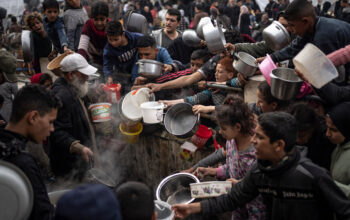Nobody expected a shortage of stuffed pandas when China won the rights to host the 2022 Winter Olympics. But a week into the Games, the Chinese public now appears interested in little else.
In the final days before the Beijing Olympics began, it seemed as though the Chinese public might barely even notice the competitions. Streets were decorated with red Lunar New Year lanterns, not the five rings of the Olympics. And coronavirus precautions made it hard to organize Olympics viewing parties.
Now though, websites are flooded with discussions about the competitions and the athletes, and an unexpected buying frenzy has emerged for Olympics memorabilia. Souvenir coins are selling well. So are nonfungible token Olympics pins. (NFTs are digital files created using blockchain computer code, much like the code that makes Bitcoin possible.)
And most popular of all is an 8-inch-tall plush stuffed animal version of the Beijing Olympics mascot — Bing Dwen Dwen, a rotund panda in a suit of ice. The main version of the stuffed animal weighs seven ounces and sells for $30 at 162 official Olympics memorabilia stores nationwide. Long lines form every morning to buy limited stocks.
Online scalping of the toys has also been rife, despite efforts by the authorities to stop it, with prices said to run into the hundreds of dollars. The Beijing police said on Tuesday that they were imposing unspecified administrative penalties on three people who they said had “violated normal market operations” by trading Bing Dwen Dwen stuffed animals.

Explore the Games
“There are some people who have ‘crooked ideas’ and resell at high prices,” the police said in an online statement. They tried to reassure a nervous public that “active measures have been coordinated to promote production,” and that there would “be a steady supply of Bing Dwen Dwen to the market.”
The frenzy over the stuffed animal is unusual, because it is not even a limited edition. China is the center of the world’s toy manufacturing industry and makes vast numbers of stuffed animals. Stuffed pandas have long been ubiquitous in souvenir shops and toy stores.
In east-central China’s Jiangsu Province, a big manufacturing area, the Consumer Council warned bootleg panda producers against copying Bing Dwen Dwen. The council cautioned the public to steer clear of pirated pandas.
Xianyu, a popular Chinese website for secondhand trading, has halted all transactions involving Bing Dwen Dwen products. That includes Bing Dwen Dwen key rings, which sell for $9 in authorized stores but were reported to have reached $33 in online transactions before the trading halt.
On Friday afternoon, a nearly hourlong line of shoppers waited outside the flagship Olympics memorabilia store in downtown Beijing. Nobody in the line was willing to admit buying souvenirs to speculate on the price — not even the numerous middle-aged men in black jackets.
The men insisted that they were not panda purveyors but had come to buy stuffed animals for their loved ones.
Inside the store, some counters were empty of merchandise. There was a long line for the remaining key rings.
Jiang Chao, a 37-year-old Beijing resident in a green coat, said that the design of Bing Dwen Dwen appealed to adults as well as children. He also saw national pride in the panda’s popularity.
“A main reason is the rise of domestic brands,” he said. “We are proud of the opening of the Winter Olympics. We are also confident in our culture.”
When a guard announced that all of the day’s quota of stuffed animals had been sold, Zhao Tianyu, a Beijing teenager, was not deterred.
“No worries,” he said. “We will wait here all night long.”
Li You contributed research.


